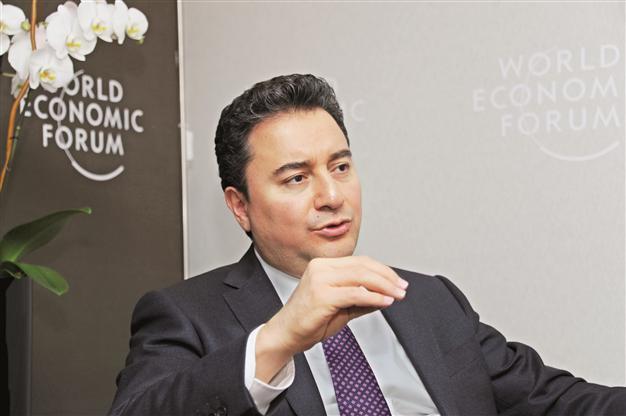Emerging markets bid to reassure Davos
DAVOS - Agence France-Presse

Capital is not flowing out of Turkey despite the lira’s depreciation, Turkish Deputy Prime Minister Ali Babacan has said during Davos to soothe concerns. AA phoyo
Officials from top emerging market economies, the star performers of recent years, were at pains to reassure the World Economic Forum of their countries’ stability amid turmoil in the currency markets.With the Argentinean peso plunging 14 percent in two sessions of panic selling and the Turkish lira hitting all-time lows amid political chaos, the stability of emerging markets sparked concern among the movers of shakers at the Davos ski resort.
But delegates were urged to look beyond the short-term volatility currently roiling the emerging markets and focus on the positive fundamentals.
Turkish Deputy Prime Minister Ali Babacan told the forum that despite the lira crashing through the key level of 2.3 to the dollar, this was not due to investors taking fright and pulling out of the country.
Dismissing the recent volatility as “temporary” and “repricing”, he told a packed audience at Davos that “people who are actually investing in Turkey are keeping their money in Turkey.” “People who have long-term confidence in the country are still there and they have a long-term view, which is important for us.” Nevertheless, he acknowledged that several Turkish companies were buying euros and dollars for fear of a further decline in the lira amid a corruption scandal that has sparked a deep political crisis.
“Especially the local political events, they think it is better to buy dollars or euros now rather than waiting.” Carlos Ghosn, head of Renault-Nissan, said investors like him also had to take the long-term view and ride out short-term volatility.
The emerging markets also shrugged off fears that their economies would suffer from the U.S. Federal Reserve’s decision to “taper” its $85-billion a month stimulus program. Last month, the world’s biggest central bank cut this program by $10 billion, prompting worries that investors who had parked this excess liquidity in emerging markets for higher yields would pull it out.
But the finance minister of India, whose country was hit especially hard in May when the Fed warned it might begin the “taper”, told AFP that his economy was well prepared in the event of further withdrawal of stimulus.
“Now I think we have done a lot of preparatory work. There will be some consequences in developing and emerging economies but I think we are better prepared for the taper than when we were surprised in May.”
















